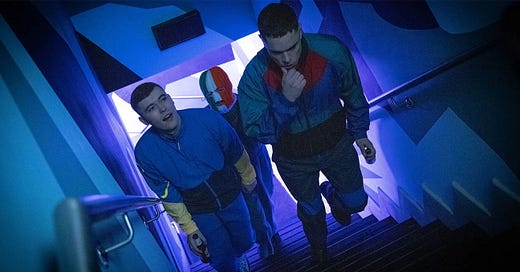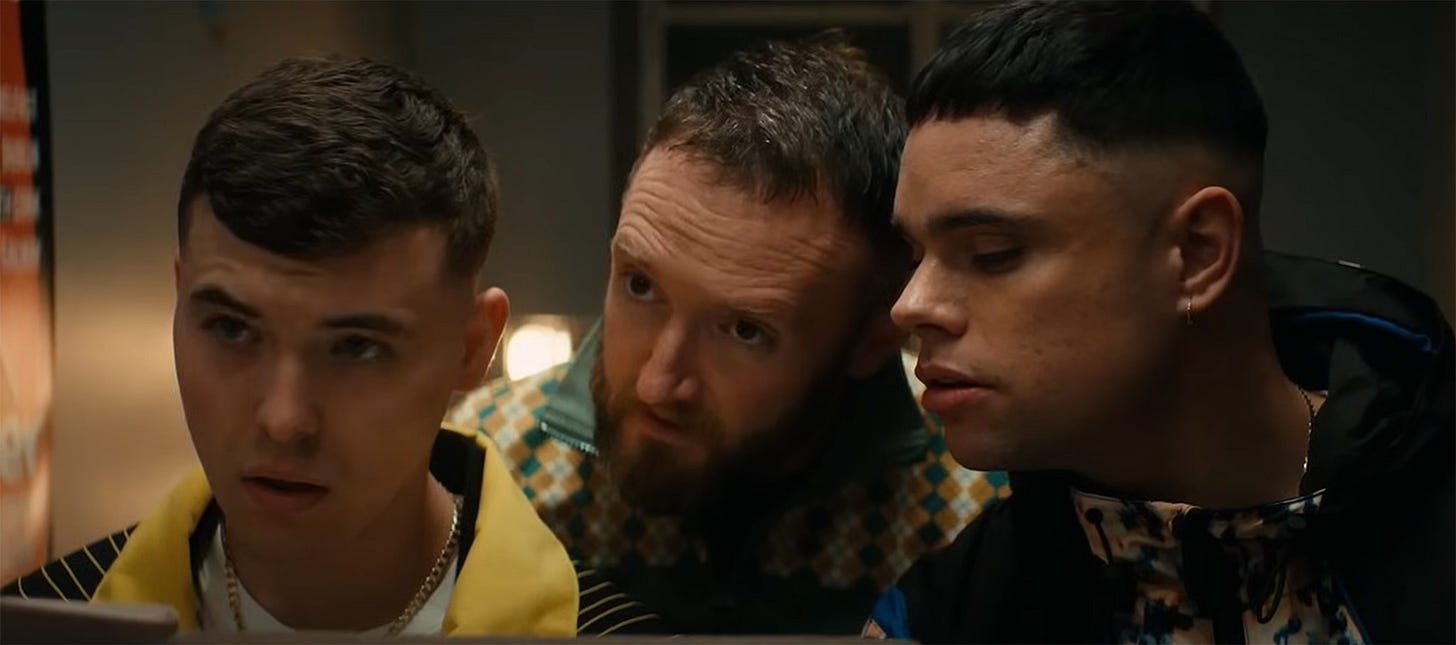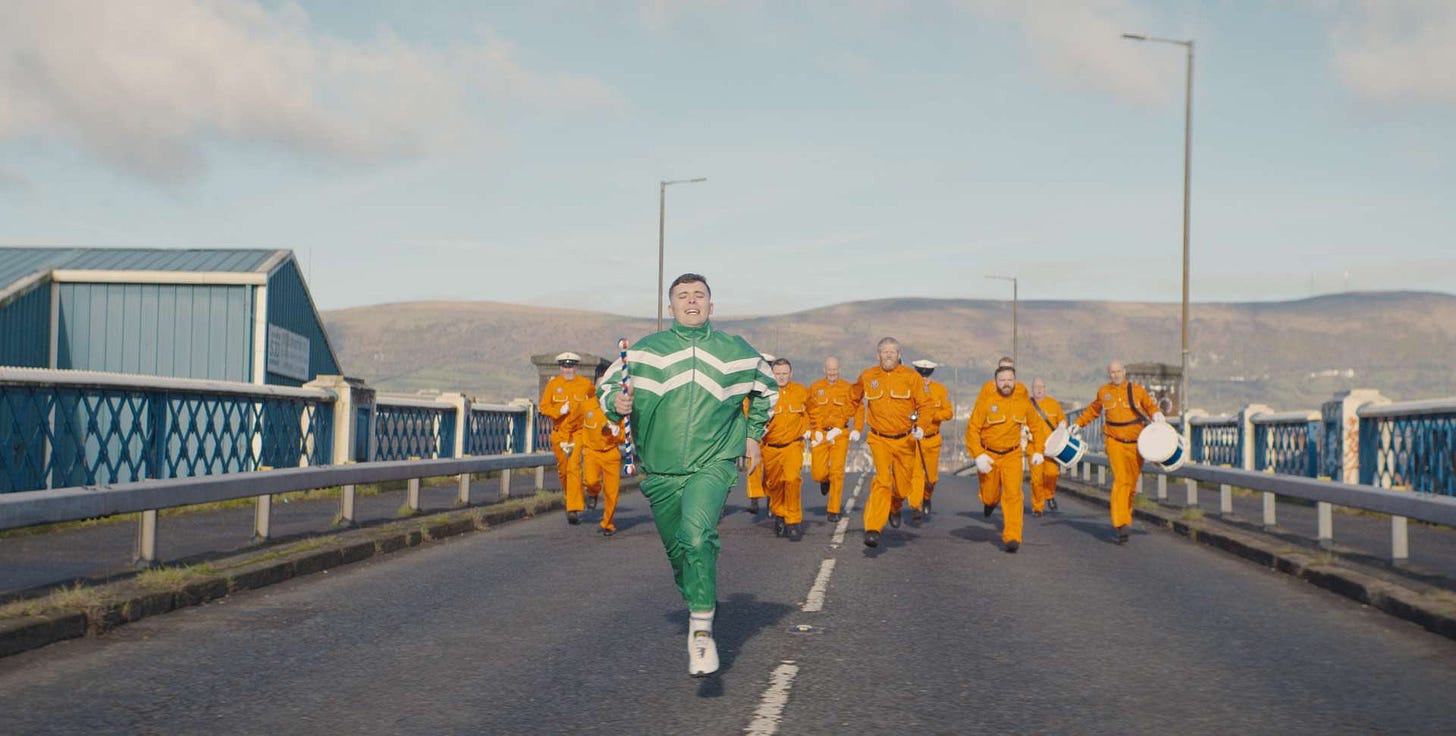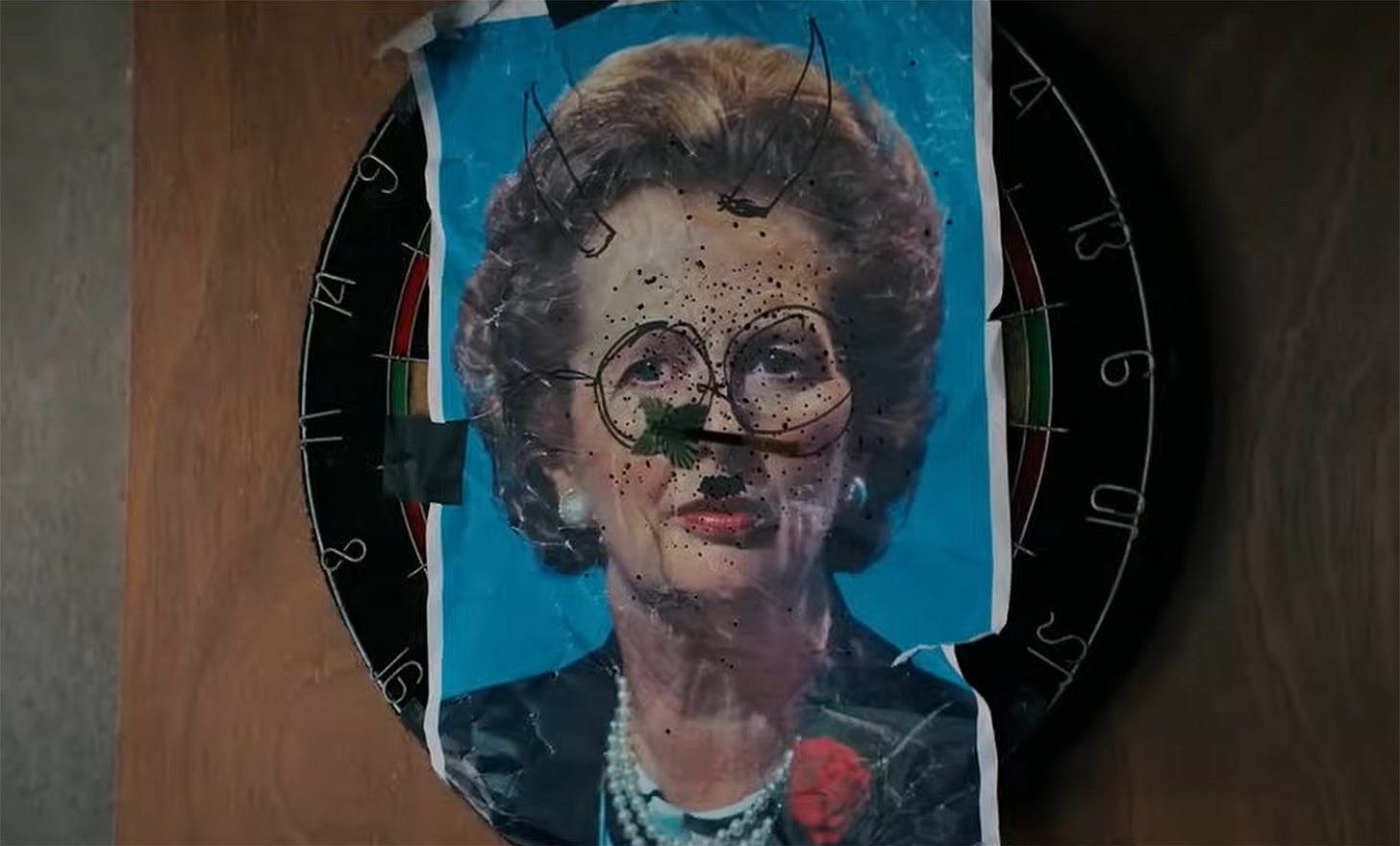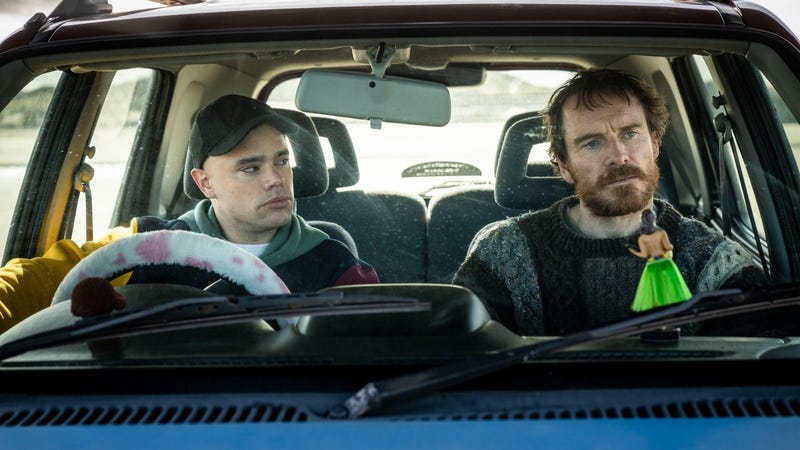Kneecap (2024)
9/10
As a semi-autobiographical musical drama mythologizing popular musicians, Kneecap resembles Purple Rain, 8 Mile, Get Rich or Die Tryin’, and early Elvis Presley films like Loving You and Jailhouse Rock. Unlike those films, Kneecap—depicting the Irish hip-hop trio of the same name—defines itself by an explicitly political perspective, specifically that of an oppressed nation. The fact that the U.K. recently charged Kneecap member Liam Óg Ó hAnnaidh, who performs under the name Mo Chara, with a terror offence for opposing Britain’s role in abetting the Gaza genocide gives real weight to the film’s portrayal of the group as an anti-establishment force.
Kneecap, like its aforementioned forbearers, acts in some ways as a feature-length music video. While music videos of course have artistic value, their main purpose under capitalism is as a promotional tool: to publicize the artist and their music, to portray them as cool and appeal to a predominantly young audience. The simplest form is the performance clip, which simply shows the artist performing their music. More ambitious videos can incorporate storylines that attempt to visually express the meaning of the songs.
Both forms are present in Kneecap, a semi-fictionalized account of the group’s origins set in their hometown of Belfast, Northern Ireland. Growing up, Liam and his friend Naoise Ó Cairealláin, stage name Móglaí Bap, learn to speak their native Irish language from Naoise’s father Arlo (Michael Fassbender), a republican paramilitary veteran who fakes his death to avoid British authorities. As young men, they live hedonistic lifestyles while writing song lyrics in Irish. When Liam runs afoul of the law, he meets J. J. Ó Dochartaigh, a teacher at an Irish-language immersion school. Impressed by Liam’s lyrics upon setting them to music, J.J. proposes that they form a hip-hop trio to help bring the Irish language to younger generations.
The newly formed group, which Liam dubs Kneecap after the punitive torture technique “kneecapping” employed by Irish paramilitaries during the Troubles, quickly gathers an audience among Belfast youth. Their open promotion of Irish republicanism, and allegedly “anti-social” behaviour, puts them in the crosshairs of various foes. A bomb attack strikes J.J.’s garage, which had served as their rehearsal space and recording studio; a group calling themselves Radical Republicans Against Drugs (RRAD) threaten and attack Liam and Naoise.
J.J., fearing the effects on his teaching career and on the campaign led by girlfriend Caitlin (Fionnuala Flaherty) for a law to officially recognize the Irish language, dons an Irish-tricolour balaclava and performs anonymously as “DJ Próvaí”. Liam develops a romantic relationship with Georgia (Jessica Reynolds), a Protestant whose aunt Detective Ellis (Josie Walker) is an Ulster Loyalist prepared to use police repression against her niece’s suitor as well as his band. Meanwhile, radio stations bend to censorship pressure and ban Kneecap’s single for its lyrical content.
Having a rebellious image has been key to the popularity of many young artists going back at least to the dawn of the rock ‘n’ roll era. That rebellion is often superficial, aiming to appeal to young listeners by outraging their parents. At the same time, deeper threats to social mores lurk beneath the surface. Outrage over Elvis in the 1950s, for example, arose from his pioneering mix of Black and white musical styles, which challenged the institutional racism used then and now to divide workers and prevent them from uniting against the ruling class. Still, rebellion expressed in films like Purple Rain and Jailhouse Rock tends to be highly individualized.
By comparison, Kneecap places the group’s rebellion within a clear sociopolitical context, starting with the fact that they rap in Irish. Arlo explains to young Liam and Naoise the importance of keeping Ireland’s native tongue alive. “Every word of Irish spoken,” Arlo says, “is a bullet fired for Irish freedom.” Caitlin later echoes these sentiments in explaining the need for adoption of the Irish Language Act. “A country without a language is only half a nation,” she says.
When Liam and Naoise are children, dressed as cowboys, Arlo instructs them to watch American Western films, but to watch them from the perspective of the Indigenous people. That line sums up the nature of Ireland’s national liberation struggle, and the well-known solidarity of the Irish masses for struggles of the oppressed around the world. In Canada, First Nations, Métis, and Inuit have also placed great importance on preserving their traditional languages threatened by centuries of colonization and cultural genocide. A postscript at the end of Kneecap offers the alarming statistic that an indigenous language dies every 40 days.
The hypocrisy of the British establishment comes under fire in Kneecap. Occupying powers often try to delegitimize any resistance of the oppressed by labelling it “terrorism”, even as it is the occupier who is the main purveyor of violence and terror to maintain control over a subjugated population. (Spoilers ahead.) When their garage is bombed, Kneecap initially suspect RRAD. After chaos erupts at a Kneecap concert and police arrest Liam, Ellis viciously beats him and reveals that she arranged for their garage to be bombed, seeing Kneecap’s rise to fame as a threat. (Kneecap offers an interesting comparison to A Hard Day’s Night in that where The Beatles were shown running from screaming girls, Kneecap are running from the police.)
We see the same dynamic today, most visibly in Palestine. Imperialists in Britain, the United States, Europe, and Canada continue to offer full backing to Israel’s genocide in Gaza and its wars of aggression against Lebanon, Syria, Iran, etc. They supported Israel as it committed one of the most violent terrorist acts in history with the 2024 pager attack in Lebanon. Yet the imperialists and compliant media reserve the label of “terrorist” for anyone who resists this mass slaughter. While the British establishment charges Mo Chara with “terror” offences for allegedly supporting Hezbollah, Prime Minister Keir Starmer abets Israel’s state terrorism and extends a U.K. invite to Abu Mohammad al-Jolani, leader of a proscribed terrorist organization but now head of a compliant Western puppet regime in Syria.
References to the struggles of other oppressed groups are scattered throughout Kneecap. We see a Palestinian flag flying from a Belfast apartment. We pass a mural with a portrait of the great African-American civil rights leader and abolitionist Frederick Douglass. J.J. explicitly points out during a concert how hip hop gave a voice to the struggles of Black Americans, and how Kneecap aims to do the same for Ireland through their own music. Conversely, Naoise mocks an image of the oppressor with a defaced picture of Margaret Thatcher in his home.
Considering their lack of acting experience, the members of Kneecap offer decent enough performances. Like Elvis and Prince before them, they tend to rely more on their natural charisma. Writer-director Rich Peppiatt is smart enough to surround them with respected Irish actors who handle much of the emotional heavy lifting. The casting of Fassbender in particular is a stroke of genius. Having played Provisional Irish Republican Army member and hunger striker Bobby Sands in Hunger, Fassbender is the perfect choice for Arlo, implicitly connecting his fictional character to real-life martyr Sands.
Peppiat also includes some flashy directorial tricks, particularly during Kneecap’s frequent drug-induced hazes. A scene in which the group speak to a radio promoter while high out of their minds amusingly replaces the actors with claymation figures. The humour of Kneecap distinguishes it from more self-serious films like 8 Mile and helps endear us to the group members, taking inspiration from their often comic lyrics. Much of the film’s dialogue is in Irish, as is Kneecap’s rapping. Switching between Irish and English adds to the movie’s offbeat quality.
As the British state’s persecution of Mo Chara shows, the Irish liberation struggle remains a real threat to British imperialism. Kneecap shines a light not just on its titular group, but on struggles of the oppressed that too often remain taboo in capitalist media, and does so in thoroughly entertaining fashion.

